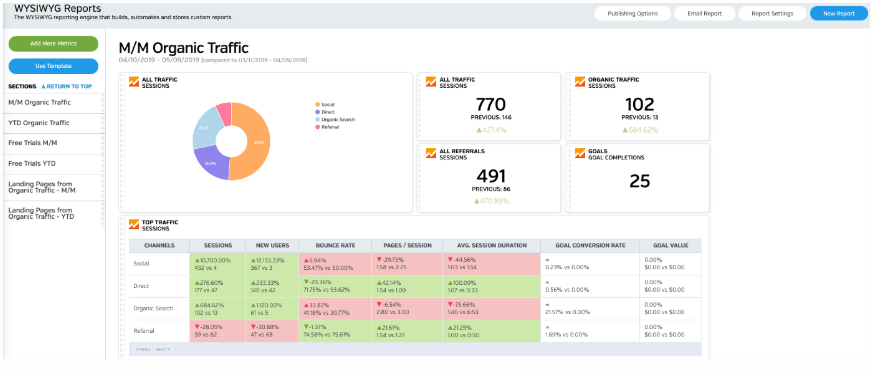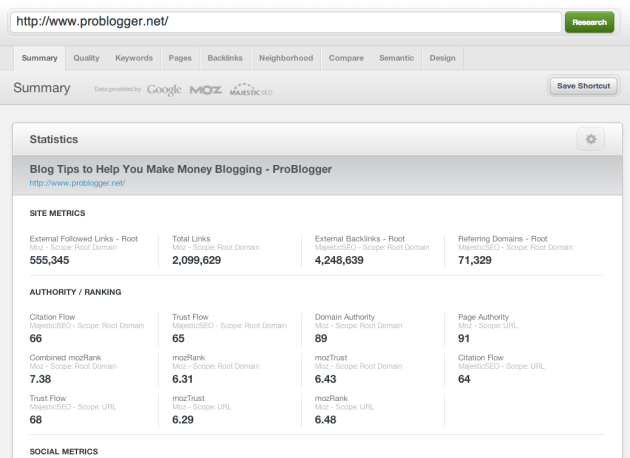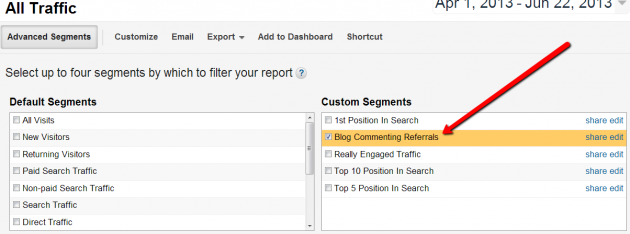Anyone can comment on a blog post. But that doesn’t mean comment marketing is simple.
Most Internet marketers treat commenting primarily as a link building tactic (spamming, basically) and don’t really give it a fair shake as a real marketing tactic.
But true comment marketing is about sharing meaningful opinions and thoughts in a forum of like-minded individuals in order to encourage interaction, make connections and earn exposure.
Blog commenting not only gives people an idea of who you are and what you’re about, but also allows you to build a strong presence that can draw traffic and leads to your site for months and even years to come.
Marketing via blog commenting encompasses a lot of what online marketing is all about – and it works best with a real strategy. Here’s how to get started.
Define your goal and target blogs
The easy way to get started is to just dive in and start commenting, but to get the biggest bang for you buck, you want to treat this as a more structured initiative.
Decide what your goal is by commenting. Are you interested in building up your thought leadership reputation online, or are you more focused on getting traffic?
Choose your target blogs. The ideal target list should contain blogs that publish frequently, have high traffic volume, and ideally are only one click away from your site.
Find prospects for your industry through social media monitoring of specific industry keywords, then research potential targets focusing on a quality metric like MozTrust and MozRank or Majestic SEO’s Citation Flow and Trust Flow.
Editor’s Note: Raven customers can research potential target blogs with Raven’s Research Central– you can even create a custom quality score just for comment marketing targets.
If your goal is to get traffic, it’s critical to find blogs that offer a direct link to your website from your comment (instead of a link to your profile on that site). That can make a world of difference in the amount of referral traffic that you will receive. For example, good targets for a search marketing agency might include Search Engine People or Problogger.
If you’re focusing on comment marketing as a reputation and branding effort, you can place more importance on popularity and relevancy, and less importance on the ease of the click-through. Examples for a search company might include: Moz, Search Engine Watch
If you’re focusing on thought leadership, don’t forget about Q&A forums like Quora. Obviously, Quora isn’t a blog but you can still make notable comments and keep up with activity on niche-specific categories).
Remember: Once you get started, you’ll want to visit these sites frequently and allot time to comment thoughtfully, so make sure your list of target sites is a manageable one.
Organize your efforts
Once you’ve got your list of promising target blogs, the next step is to organize and keep up with them.
The obvious way to do this is to use an RSS reader. Personally, I like to use Hootsuite for this. I create a separate tab that houses my RSS feeds so I can glance at them whenever I check my other networks and leave a comment early on a new piece of content.
If you aren’t already familiar with your target list of blogs, you may want to spend a few days just reading their content and getting familiar with their style and community of commenters. Make sure you know the lay of the land before diving in and commenting.
Finally, set the stage for successful comment marketing by signing up for Gravatar before you start commenting. Keep your avatar consistent across all your commenting efforts so you can build recognition and trust.
Start commenting
Your list is ready, you’re familiar with your targets and now you’re ready to start commenting.
Here are some general dos and don’ts to keep in mind while commenting.
Do:
- Write meaningful comments. Have something real to say. You should be trying to genuinely add to the conversation.
- Push the envelope. Don’t be afraid to show a different perspective, raise some eyebrows, or make people think. This is exactly the kind of thing that helps people remember you.
- Be playful. Not every comment has to be a serious, strategic or life-changing. Appropriate comedic relief is more than welcome on most blogs.
- Connect. Commenting is an underutilized networking technique. It allows people to find common ground almost instantly.
Don’t:
- Leave a generic comment. Even if it’s just a “thank you for this post” comment, elaborate on the parts of the content you liked most. Add to the conversation.
- Be tasteless. If you have a different opinion, say so in a way that’s respectful of other people’s views – and be prepared to back it up in a civil way.
- Comment without reading the post. You’re only going to look clueless or silly when you get corrected on something you say in your comment.
- Link drop. Unless the link is very relevant to the discussion at hand, your comment will almost certainly be received as self-promotional and might not even published at all.
Schedule time for maximum speed
Ideally, you’ll want to set aside some time every day to make the rounds at your target blogs.
A key component in comment marketing that results in traffic back to your site is the speed in which you leave comments after new content is posted.
Of course, speed is dependent on the quality of the other comments (and the post in general), and how many other comments there are on the post.
As an example, one of my comments on Moz has generated 25 visits in the last few weeks and is the 14th comment. A visitor has to do a substantial amount of scrolling before seeing that comment, but because that community expects to see great information in the comments as well, it still generates a fair amount of traffic.
I’ve commented on popular blogs late in the game after the initial “feeding frenzy” was done, and still got a solid amount of traffic because of the relevancy of the comment itself.
Every blog is different, and over time each blog’s particular “window” should appear more clear to you. If you’re targeting a blog you’re less familiar with, it’s best to try to post early at first and see what kind of impact you see. Then you can experiment by changing certain components around (speed, type of comment, etc). That’s where measuring the results of commenting comes into play.
Measure your efforts
It may seem a little strange to measure blog commenting, but this step is a must. It’s like anything else – if you don’t measure your efforts, you’ll never know where you’re getting the most bang for your buck.
I measure this in Google Analytics by creating an advanced segment for the referral traffic.
In addition to creating revealing segments for your comments, if you have goals set up you can see just how beneficial each source is. This also opens up exciting bottom-line possibilities if you have goal values assigned.
Refine your strategy
As you start to measure your efforts, you’ll see things that need to be tweaked or tested.
Depending on the popularity and freshness of the post your commenting on, you can often see results in the first few days of posting your comment. Use your segments/goals to get an accurate view of how your comment marketing is affecting your traffic.
If certain sites aren’t bringing you the traffic that you’d like, you may decide to delete them from your regular rotation. If a particular site is bringing a large amount of traffic from commenting, you may want to prioritize it. Sites like this are great for regular commenting as it helps to build reputation and trust.
Regular commenting can also help create a relationship with the blog owner. Bloggers love frequent commenters that add to the conversation!
TL;DR cheat sheet
Of all the comments I’ve left, the most popular ones seem to have these ingredients in common:
- They were posted on popular blogs
- They contained a direct link to my site within my name or the comment itself
- They were posted very soon after the content was published
- They were relevant and helpful to the readers
Just use your best judgement and remember that at the end of the day you should be trying to genuinely add to the conversation.
Has comment marketing been successful for you? Let me know your tips in the comments.

White Labeled and Branded Reports. Drag and Drop Editor. Automate your SEO, PPC, Social, Email, and Call Tracking Reporting.







Great post Jared, I’m actually working on a pretty massive traffic generation post. I’ll drop a link to this post in the commenting referral segment!
I also didn’t know about the Raven Tools research central bit, it’s pretty fair to say I have overlooked Raven Tools – As soon as I’m back of holiday I’ll spend a couple hours fully looking over the suite 🙂
Awesome Charles, thanks. I’m glad you found the post helpful.
Hmm. This is an interesting strategy, but I almost think it’s too MUCH strategy.
One of my biggest “commenting” challenges is finding the right posts to comment on. Sometimes my top “go to” spots have plenty of stuff. Sometimes, they just aren’t that insightful that day, or I just don’t have any insights to add to what they’ve got to say. If I’m going to leave comments, I have to go to places that may not be as strategically ideal.
Strategically ideal or not, some of those places might just have posted some great stuff that day that inspired me to get up and say something.
It can seem a little like overkill, but think about it like this-you’re already commenting, so why not organize your commenting process, and then measure it?
It’s another means of getting traffic, so measuring will give you insight as to what kind of sites have the most engagement with your site, and could even be a critical step in establishing visitor personas.
Mindset is very important when comment marketing. At the core of your comment marketing is the mindset of providing value first and foremost. Making sure that your comment has something that will help the readers will surely help you with your goal whether you’re doing it for traffic, authority, etc.
Great Job Jared,its really very useful for us
Jared – Just curious, are links in blog comments mostly “no follow” and thus a futile effort when it comes to link building?
Yes, the commenting section of most blogs are automatically nofollow. I wouldn’t treat blog commenting as a form of link building.
When commenting, think more along the lines of “connection building”. Links can be earned from commenting, yes, but it’s usually after some sort of relationship has been made with the blogger or another person commenting.
Great post. Articles that have meaningful and insightful comments are more enjoyable, at least to me. It’s interesting to read what other people thought and how it relates to them or their clients, as their perspective could possibly help you in the future.
No joke, this is one of the best articles I’ve read on the subject of blog commenting. It’s important to note, particularly for first-time bloggers, that blog audiences are made up of multiple constituencies, stakeholders or sub-groups which individually have their own basis for evaluating the usefulness of your content. Sometimes it makes sense to pivot on your content and focus on a new or different audience than you started out writing for. One nice thing about attracting lots of comments is that people inadvertently highlight what is valuable about the content they’re responding to and tell you which way to pivot.
Thanks for the kind words Tyler. Great word! “Pivot” is something that applies to this strategy in SO many ways. I wish I would have given that word emphasis to in the post. It’s especially useful when commenting because you have to be able to pivot to the pulse of the comments so that you can correctly reach the people that are engaging with a specific mindset.
Hey Jared,
We featured you on our Monthly Resource Round-up: http://www.aseohosting.com/blog/2013/09/seo-content-marketing-social-media-best-august-2013/
Cheers!
Very cool! Thanks a bunch. Glad you enjoyed the post 🙂
Sorry for the late response Nicky, I just saw this.
One way to earn instant money is through online marketing. Thank you so much for giving us enough information that will surely help us through our online venture. It is very timely and informative.
I would like to test this tools! I have an agency http://www.teksyte.com and I think Raven tools can be usefull for us!